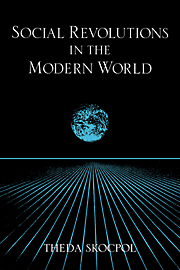Book contents
- Frontmatter
- Contents
- Acknowledgments
- INTRODUCTION
- I DOING MACROSCOPIC SOCIAL SCIENCE
- II MAKING SENSE OF THE GREAT REVOLUTIONS
- III A DIALOGUE ABOUT CULTURE AND IDEOLOGY IN REVOLUTIONS
- 7 Ideologies and social revolutions: Reflections on the French case
- 8 Cultural idioms and political ideologies in the revolutionary reconstruction of state power: A rejoinder to Sewell
- IV FROM CLASSICAL TO CONTEMPORARY SOCIAL REVOLUTIONS
- CONCLUSION
- Index
7 - Ideologies and social revolutions: Reflections on the French case
Published online by Cambridge University Press: 05 June 2012
- Frontmatter
- Contents
- Acknowledgments
- INTRODUCTION
- I DOING MACROSCOPIC SOCIAL SCIENCE
- II MAKING SENSE OF THE GREAT REVOLUTIONS
- III A DIALOGUE ABOUT CULTURE AND IDEOLOGY IN REVOLUTIONS
- 7 Ideologies and social revolutions: Reflections on the French case
- 8 Cultural idioms and political ideologies in the revolutionary reconstruction of state power: A rejoinder to Sewell
- IV FROM CLASSICAL TO CONTEMPORARY SOCIAL REVOLUTIONS
- CONCLUSION
- Index
Summary
This article was inspired – perhaps I should say provoked – by Theda Skocpol's States and Social Revolutions. I believe that her book deserves the general acclaim it has received as a model of comparative historical analysis and as a brilliant contribution to the sociology of revolutions. But I also believe that Skocpol's treatment of the role of ideology in revolution is inadequate. This article begins by developing an alternative to Skocpol's conception of ideology, then demonstrates how this alternative conception can help to illuminate the history of the French Revolution, and concludes with some suggestions for future comparative studies of revolutions.
Skocpol's goal in States and Social Revolutions is to specify, by means of a comparative historical analysis, the causes and the outcomes of the three great social revolutions of modern times: the French, the Russian, and the Chinese. She analyzes revolutions from what she terms a “non-voluntarist, structuralist perspective,” emphasizing three fundamental structural relations: (1) between classes (especially landlords and peasants), (2) between classes and states, and (3) between different states in international relations. To summarize a very complex and subtle argument, Skocpol sees a particular combination of conditions as being conducive to social revolution: (1) well-organized and autonomous peasant communities, (2) a dominant class of absentee agricultural rentiers who are highly dependent on the state, and (3) a semibureaucratized state that falls behind in military competition with rival states.
- Type
- Chapter
- Information
- Social Revolutions in the Modern World , pp. 169 - 198Publisher: Cambridge University PressPrint publication year: 1994
- 11
- Cited by



